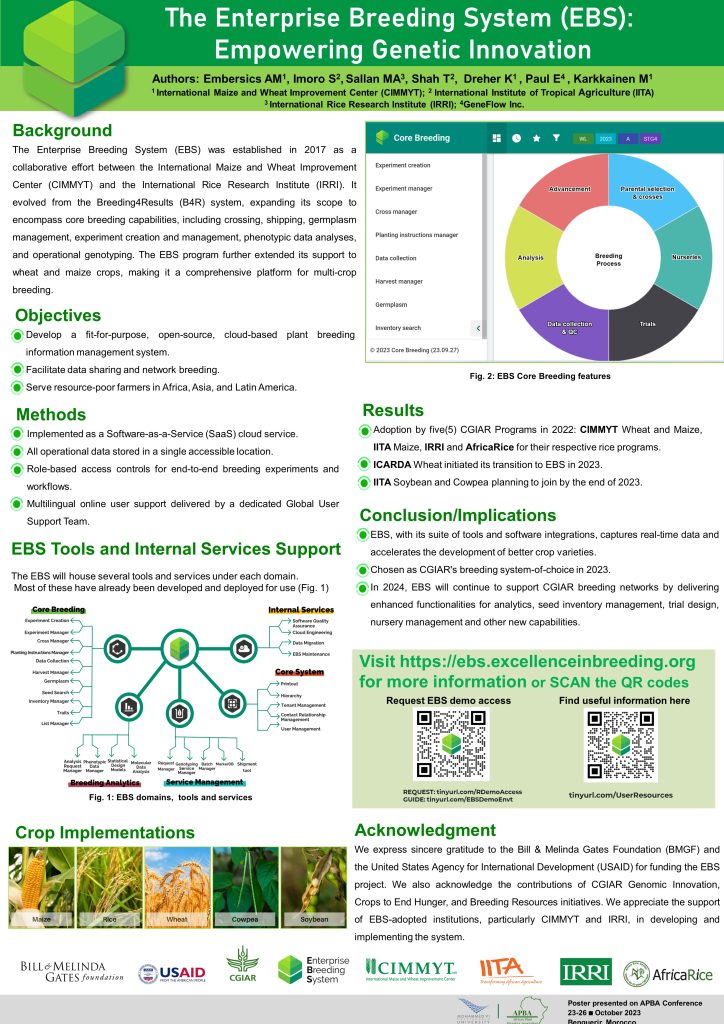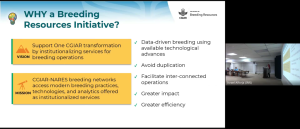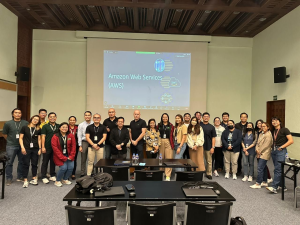Presented by Simon Imoro, IITA Data Manager for Breeding, the session and poster, resulting from a team-effort, aimed to amplify the visibility of EBS, fostering accessibility and exposure to a broader audience.
EBS is positioned as CGIAR’s preferred breeding data management system in 2023 and beyond. APBA attendees were encouraged not only to recognize its role as a comprehensive, one-stop-shop breeding data management solution but also to actively sign up for and adopt the system in their respective breeding programs.
The presentation served as a platform to engage with a wide audience, who found EBS to be a valuable tool for network breeding. The platform captured the interest of diverse stakeholders, from NARES partners across several African countries to graduate students and colleagues from CGIAR.
Notably, the International Center for Agricultural Research in the Dry Areas (ICARDA), currently deploying the tool in Morocco, had organized a comprehensive EBS adoption training just days prior. Already, five CGIAR breeding programs at CIMMYT, IITA, IRRI, and AfricaRice, embraced EBS, and IITA’s Soybean and Cowpea programs are planning to join EBS community by the end of 2023.
The poster presentation prompted important questions, ranging from its comparative advantages to practical aspects like data analysis, installation, and training. Questions included inquiries about EBS’s compatibility with existing systems, its cost, data analysis capabilities, installation requirements, and accessibility. The team highlighted the system’s free-license, its suitability for data analysis, and its open-source nature, addressing concerns about data privacy and usage.
Current CGIAR Breeding Management System (BMS) users were also concerned about the transition period, as the platforms is gradually being phased out. They were reassured and ensured that they will receive continuous support should they choose to transition to EBS.
The team addressed these questions diligently, clarifying the system’s features and benefits to enhance understanding and confidence among potential users. Attendees were directed to visit EBS official website for in-depth information.
This wide-ranging appeal and interested from participants underscore EBS’s relevance and applicability in different contexts within the agricultural research community. It also showcases its relevance in advancing genetic innovation and marks a significant step toward its broader adoption in various breeding programs.
Simon Imoro declared: “APBA session provided a unique opportunity to showcase EBS, receive valuable feedback, and connect with peers in the breeding data management community. The insights gained from this community will contribute to the ongoing development of EBS, solidifying its role as a pioneering solution for breeding data management and genetic innovation among CGIAR Centers, partners and beyond.”
Looking ahead, EBS will continue to support CGIAR breeding networks by delivering enhanced functionalities for analytics, seed inventory management, trial design, nursery management and other new capabilities.







